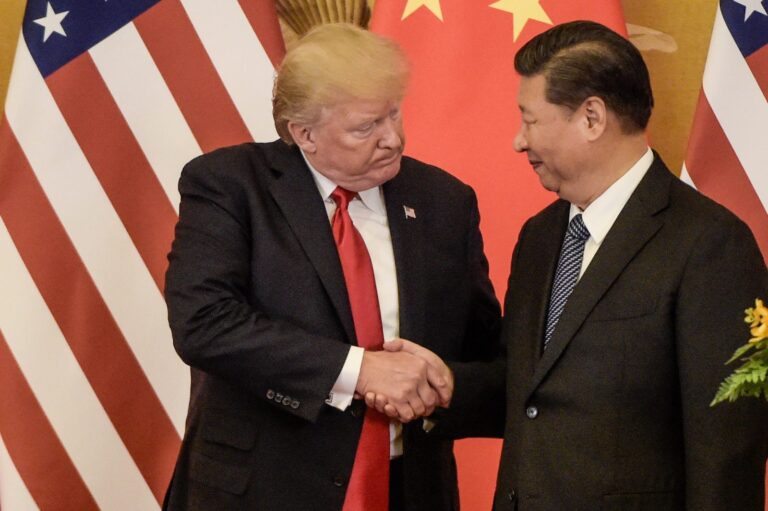
[ad_1]
The South China Sea (SCS) and Taiwan Strait have become focal points of geopolitical tension in the Asia-Pacific region due to conflicting territorial claims and strategic interests.
Amidst this backdrop, the United States has assumed a crucial role in preserving stability and the balance of power, especially considering China’s increasingly assertive actions.
However, with the uncertainties surrounding a potential second term of former president Donald Trump, crucial questions loom over the future direction of US policy in the region.
Trump’s previous administration pursued a strategy of strategic engagement and deterrence to counter China’s aggressive behavior, including freedom of navigation operations and military presence in the SCS.
Yet, his approach has also been characterized by unpredictability and transactional diplomacy, raising concerns about the consistency and effectiveness of US policy.
As the political landscape evolves, stakeholders are closely monitoring the trajectory of US involvement in the Asia-Pacific, recognizing its significant implications for regional stability and security.
China’s assertive actions in the SCS have triggered widespread concern among neighboring countries and the international community. Despite a 2016 ruling by the Permanent Court of Arbitration in favor of the Philippines and invalidating China’s expansive territorial claims in the region, Beijing persists in asserting sovereignty over nearly the entire sea.
This includes the construction of artificial islands and military facilities, escalating tensions with neighboring claimant states like Vietnam, the Philippines, and Malaysia. China’s disregard for the territorial rights of other nations has led to increased militarization and raised fears of potential conflict.
Similarly, tensions in the Taiwan Strait have escalated as China intensifies pressure on Taiwan to accept its “One China” principle. Beijing has conducted military exercises near Taiwan and increased diplomatic isolation of the island, aiming to coerce compliance. Such actions underscore China’s determination to assert control over the self-governing island.
The heightened tensions in both regions pose significant challenges to regional stability and security, prompting concerns about the potential for military confrontation and the need for diplomatic efforts to de-escalate tensions and find peaceful resolutions to these longstanding disputes.
In response to China’s assertive actions, the US has adopted a policy of strategic engagement and deterrence in the region. This approach involves conducting freedom of navigation operations (FONOPs) and maintaining a visible military presence to uphold international law, support allies and deter any unilateral attempts to alter the status quo in the SCS and the Taiwan Strait.
By demonstrating its commitment to regional stability and security, the US aims to counterbalance China’s growing influence and prevent the escalation of tensions.
However, Trump’s approach to the region has introduced elements of unpredictability via his transactional diplomacy. While his previous administration took a firm stance against China through measures like imposing tariffs and sanctioning Chinese entities, Trump also pursued a personal rapport with Chinese President Xi Jinping.
This caused fluctuations in US policy, with moments of cooperation interspersed with periods of heightened tension. If former president Trump secures re-election in November 2024, his policy toward the SCS and Taiwan Strait is expected to uphold key US interests in the region.
This includes prioritizing freedom of navigation, safeguarding international law and supporting allies such as Taiwan. But while Trump’s previous administration demonstrated a strong stance against Chinese aggression in the SCS, his personal diplomacy with Chinese President Xi Jinping raises concerns about the continuity of his approach in a second term.
Trump’s inclination to prioritize short-term gains and his willingness to engage in quid pro quo negotiations with adversaries may potentially undermine efforts to maintain a stable and predictable security environment in the region.
Therefore, while the overall strategic objectives of US policy in the SCS and the Taiwan Strait are likely to remain consistent, how they are pursued may vary depending on Trump’s tactical decisions and wider negotiations with China.
Effectively managing potential conflict in the SCS and the Taiwan Strait requires a balanced approach centered on stability, adherence to international law and cooperation among stakeholders. While the US plays a pivotal role in maintaining regional balance, the consistency and strategic clarity of its policy are paramount.
Under a potential second Trump term, US policy may continue to prioritize deterrence and strategic engagement with China. However, Trump’s diplomatic approach and personal relations with Xi may introduce uncertainty, jeopardizing the principled and strategic approach needed to safeguard its interests while fostering peace and prosperity in the region.
Simon Hutagalung is a retired diplomat from the Indonesian Foreign Ministry who received his master’s degree in political science and comparative politics from the City University of New York. The opinions expressed in this article are his own.
[ad_2]
Source link